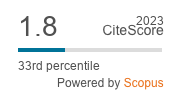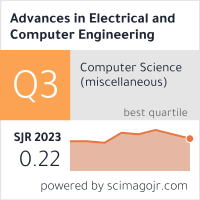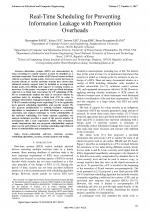| 2/2017 - 16 | View TOC | « Previous Article | Next Article » |
Real-Time Scheduling for Preventing Information Leakage with Preemption OverheadsBAEK, H. |
| Extra paper information in |
| Click to see author's profile in |
| Download PDF |
Author keywords
embedded software, real-time systems, scheduling algorithms, security, system analysis and design
References keywords
time(53), systems(51), real(48), scheduling(19), security(15), analysis(13), embedded(9), tasks(6), task(6), rtss(6)
Blue keywords are present in both the references section and the paper title.
About this article
Date of Publication: 2017-05-31
Volume 17, Issue 2, Year 2017, On page(s): 123 - 132
ISSN: 1582-7445, e-ISSN: 1844-7600
Digital Object Identifier: 10.4316/AECE.2017.02016
Web of Science Accession Number: 000405378100016
SCOPUS ID: 85020105673
Abstract
Real-time systems (RTS) are characterized by tasks executing in a timely manner to meet its deadlines as a real-time constraint. Most studies of RTS have focused on these criteria as primary design points. However, recent increases in security threats to various real-time systems have shown that enhanced security support must be included as an important design point, retro-fitting such support to existing systems as necessary. In this paper, we propose a new pre-flush technique referred to as flush task reservation for FP scheduling (FTR-FP) to conditionally sanitize the state of resources shared by real-time tasks by invoking a flush task (FT) in order to mitigate information leakage/corruption of real-time systems. FTR-FP extends existing works exploiting FTs to be applicable more general scheduling algorithms and security model. We also propose modifications to existing real-time scheduling algorithms to implement a pre-flush technique as a security constraint, and analysis technique to verify schedulability of the real-time scheduling. For better analytic capability, our analysis technique provides a count of the precise number of preemptions that a task experiences offline. Our evaluation results demonstrate that our proposed schedulability analysis improves the performance of existing scheduling algorithms in terms of schedulability and preemption cost. |
| References | | | Cited By |
Web of Science® Times Cited: 2 [View]
View record in Web of Science® [View]
View Related Records® [View]
Updated today
SCOPUS® Times Cited: 2
View record in SCOPUS® [Free preview]
View citations in SCOPUS® [Free preview]
[1] A Task Parameter Inference Framework for Real-Time Embedded Systems, Jung, Namyong, Baek, Hyeongboo, Lee, Jinkyu, Electronics, ISSN 2079-9292, Issue 2, Volume 8, 2019.
Digital Object Identifier: 10.3390/electronics8020116 [CrossRef]
[2] Cluster formation techniques for hierarchical real time tasks allocation on multiprocessor system, Talmale, Girish, Shrawankar, Urmila, Concurrency and Computation: Practice and Experience, ISSN 1532-0626, Issue 21, Volume 33, 2021.
Digital Object Identifier: 10.1002/cpe.6438 [CrossRef]
Disclaimer: All information displayed above was retrieved by using remote connections to respective databases. For the best user experience, we update all data by using background processes, and use caches in order to reduce the load on the servers we retrieve the information from. As we have no control on the availability of the database servers and sometimes the Internet connectivity may be affected, we do not guarantee the information is correct or complete. For the most accurate data, please always consult the database sites directly. Some external links require authentication or an institutional subscription.
Web of Science® is a registered trademark of Clarivate Analytics, Scopus® is a registered trademark of Elsevier B.V., other product names, company names, brand names, trademarks and logos are the property of their respective owners.
Faculty of Electrical Engineering and Computer Science
Stefan cel Mare University of Suceava, Romania
All rights reserved: Advances in Electrical and Computer Engineering is a registered trademark of the Stefan cel Mare University of Suceava. No part of this publication may be reproduced, stored in a retrieval system, photocopied, recorded or archived, without the written permission from the Editor. When authors submit their papers for publication, they agree that the copyright for their article be transferred to the Faculty of Electrical Engineering and Computer Science, Stefan cel Mare University of Suceava, Romania, if and only if the articles are accepted for publication. The copyright covers the exclusive rights to reproduce and distribute the article, including reprints and translations.
Permission for other use: The copyright owner's consent does not extend to copying for general distribution, for promotion, for creating new works, or for resale. Specific written permission must be obtained from the Editor for such copying. Direct linking to files hosted on this website is strictly prohibited.
Disclaimer: Whilst every effort is made by the publishers and editorial board to see that no inaccurate or misleading data, opinions or statements appear in this journal, they wish to make it clear that all information and opinions formulated in the articles, as well as linguistic accuracy, are the sole responsibility of the author.





